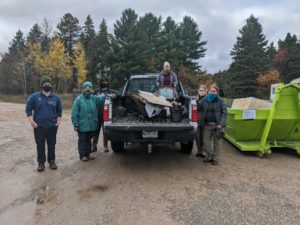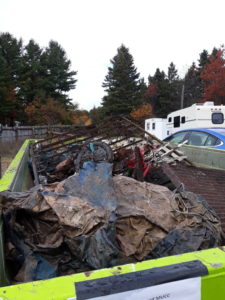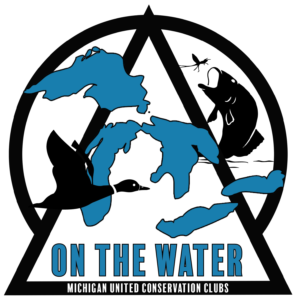Bay Mills Indian Community Event was an amazing success for the community
 Volunteering with the OTW program is a rewarding and fun way to give back to your natural resources while taking care of the watershed you enjoy. Our projects are hosted all across Michigan, and we have hosted volunteer events from the Upper Peninsula to the suburbs of Detroit. The OTW program gives individuals the opportunity to directly enhance aquatic habitat and local watersheds like streams, lakes and wetlands.
Volunteering with the OTW program is a rewarding and fun way to give back to your natural resources while taking care of the watershed you enjoy. Our projects are hosted all across Michigan, and we have hosted volunteer events from the Upper Peninsula to the suburbs of Detroit. The OTW program gives individuals the opportunity to directly enhance aquatic habitat and local watersheds like streams, lakes and wetlands.
OTW held its last event of the 2020 field season this past weekend in Bay Mill, Mi. OTW partnered up with Bay Mills Indian Community to clean up the Bay Mills community and watershed which was an amazing success. In 4 hours 18 volunteers removed 2000 pounds of trash. This is the biggest success for OTW to date, having this type of impact in a community in just a few hours is a fantastic and proves how much local communities care about their watersheds and local natural resources. With the OTW program facing a lack of funding for the 2021 season, it’s important to focus on the positives like how as of the end of October, over 450 OTW volunteers have removed 6000 pounds of trash and 105 pounds of invasive species. We have also impacted 1,750 acres of Michigan land. OTW has had an amazing, 2020 season and we hope to continue to make an impact.
partnered up with Bay Mills Indian Community to clean up the Bay Mills community and watershed which was an amazing success. In 4 hours 18 volunteers removed 2000 pounds of trash. This is the biggest success for OTW to date, having this type of impact in a community in just a few hours is a fantastic and proves how much local communities care about their watersheds and local natural resources. With the OTW program facing a lack of funding for the 2021 season, it’s important to focus on the positives like how as of the end of October, over 450 OTW volunteers have removed 6000 pounds of trash and 105 pounds of invasive species. We have also impacted 1,750 acres of Michigan land. OTW has had an amazing, 2020 season and we hope to continue to make an impact.

If you have questions or comments about the event, please contact Emma Nehan at enehan@mucc.org.
The post Bay Mills Indian Community Event was an amazing success for the community appeared first on Michigan United Conservation Clubs.
Recent Posts



